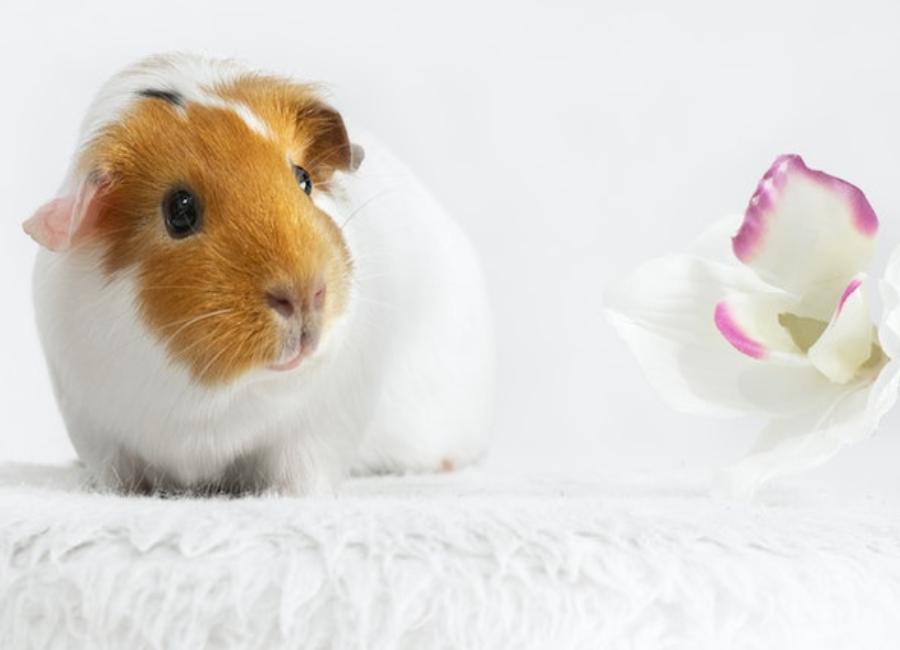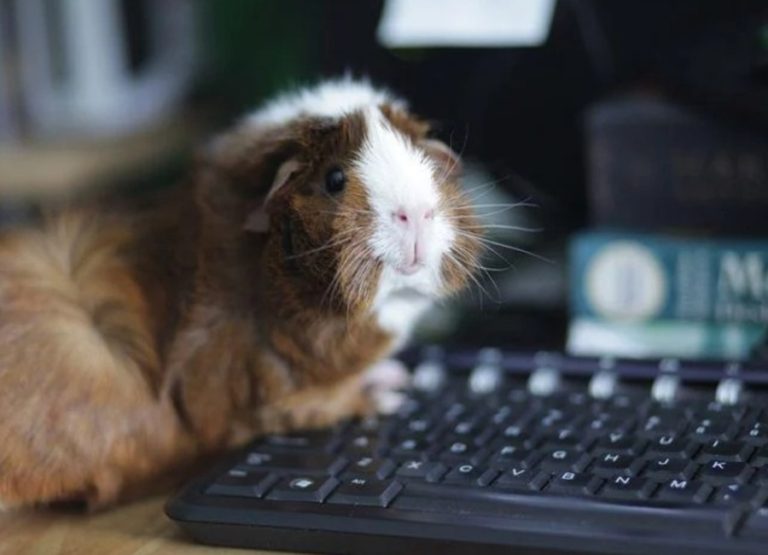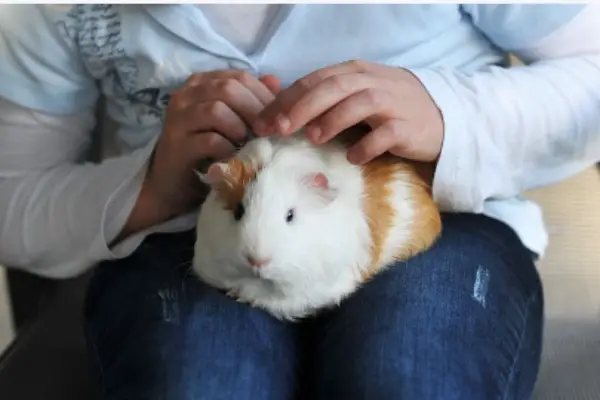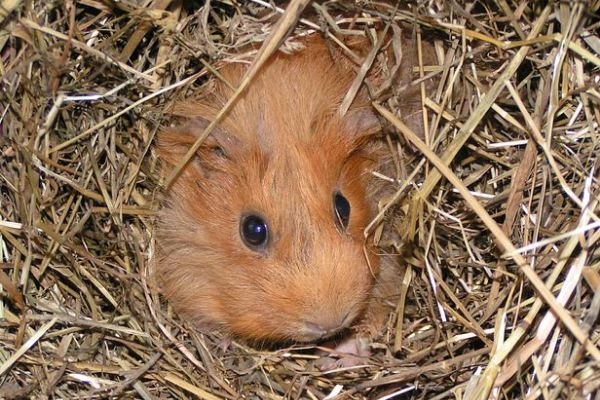12 Reasons For Guinea Pigs Not Eating

In this post, we’ll explore some common reasons why guinea pigs stop eating and what you can do about it.
Are you a guinea pig owner? If so, you know how important it is to keep your little furballs healthy and happy.
One thing that can cause concern is when your guinea pig isn’t eating. It can be a sign of a bigger health issue or just a finicky eater.
Let’s discuss guinea pigs not eating!!!
Why are my Guinea pigs not eating
There are several reasons why a guinea pig may not be eating, it could be due to infections, lack of fresh water, inability to chew properly, exposure to extreme temperatures, dietary changes, or environmental changes.
If a guinea pig does not eat, it can develop a liver disease called hepatic lipidosis.
It is important to monitor the guinea pig’s behavior and seek veterinary care if necessary.
Common Reasons Why Guinea Pigs Stop Eating
The following are some common reasons why your guinea pig might not be eating:
1. Aging
Guinea pigs may acquire health issues that cause a decline in appetite as they age.
For example, older guinea pigs may have difficulty digesting particular diets or may develop arthritis, making movement difficult.
It is critical to regularly monitor your guinea pig’s health as they age and to provide them with appropriate veterinary care.
You can also change their diet and give them softer, easier-to-chew items.
2. Change in diet
Most guinea pigs may refuse to eat if they are suddenly moved to a new type of diet.
It is critical to introduce new foods slowly and to ensure that they are properly balanced for guinea pigs.
For example, if you wish to introduce a new type of hay, start with a little amount and gradually increase the amount over several days.
3. Dental problems
Guinea pigs have continually growing teeth that must be maintained on a regular basis.
If their teeth develop too long or crooked, they may experience pain and difficulties chewing, resulting in a loss of appetite.
This is why it’s critical to supply your guinea pig with plenty of hay, which helps to naturally wear down their teeth.
Also, if you see any indicators of dental problems, such as drooling or weight loss, you should take your guinea pig to a guinea pig-experienced veterinarian to get their teeth checked.
4. Illness
A guinea pig’s appetite might be affected by a variety of ailments.
Upper respiratory diseases, for example, can make it difficult for a guinea pig to breathe, while gastrointestinal problems can induce nausea and pain.
If your guinea pig exhibits other symptoms, such as lethargy or sneezing, in addition to a decreased appetite, it is critical that you take them to a veterinarian as soon as possible.
The veterinarian can diagnose the ailment and treat it appropriately.
5. Stress
Guinea pigs are sensitive creatures that are easily stressed.
They may refuse to eat if they are in a stressful setting, such as being confined near violent or noisy animals.
It is critical to offer a peaceful and safe environment for your guinea pig.
Make sure their cage is in a calm environment, away from loud noises, and that they have plenty of hiding spots.
6. Pain
When a guinea pig is in pain, he or she may lose appetite.
Injuries, abscesses, and other disorders can all cause pain.
Hunching up, grinding their teeth, and vocalizing are all signs of pain in guinea pigs.
If you believe your guinea pig is in pain, take them to a doctor right once.
The veterinarian can determine the source of the pain and treat it appropriately.
7. Dehydration
A guinea pig’s appetite may suffer if they do not drink enough water.
Sunken eyes, dry skin, and lethargy are all symptoms of dehydration.
Ensure that your guinea pig has constant access to fresh, clean water.
You can also give them fresh fruits and vegetables that are high in water content, such as cucumber, carrots, or watermelon.
8. Overfeeding
Overfeeding can lead to obesity, which can reduce appetite.
If your guinea pig is overweight, you should modify their food and provide them with plenty of exercise chances.
You can also restrict their availability to high-calorie items, like pellets or treats, while increasing their intake of hay and fresh fruits and vegetables.
9. Dirty environment
Guinea pigs are clean animals who require a clean living environment.
If their surroundings are filthy, they may refuse to eat.
Make sure to clean your guinea pig’s cage on a regular basis and provide fresh bedding, clean water, and food bowls.
To keep the environment clean and healthy, remove any uneaten food and clean up any droppings on a daily basis.
10. Other Pets
If other pets in the house are frightening or tormenting a guinea pig, it might create stress and reduce their appetite.
To avoid this problem, keep guinea pigs in a safe and secure environment away from other pets.
11. Poor-Quality Food
If guinea pigs are given stale or low-quality food, they may refuse to consume it.
It’s critical to provide fresh, high-quality food to ensure kids obtain the nutrients they require.
A meal full of fiber, vitamins, and minerals is essential for your guinea pig’s overall health.
12. Lack of Variety in Diet
Guinea pigs require a diverse diet, and if they don’t get it, they may become bored and refuse to eat.
To keep them interested in their meals, provide a variety of hay, fresh veggies, and pellets.
A lack of variety in one’s diet can also result in malnutrition and health issues.
Signs to Look For When Guinea Pigs Stop Eating
Guinea pigs can become very ill if they stop eating for an extended period of time, so look for symptoms of loss of appetite.
Reduced appetite or trouble eating, weight loss, drooling, drinking more water than usual, and a change in the frequency or consistency of their droppings are all common symptoms.
If your guinea pig is not eating or drinking, it may be ill and should be taken to the vet as soon as possible.
Additional indicators of disease to check for include tiredness, hiding, and behavioral changes.
What to Do If Your Guinea Pig Stops Eating
Here are some common things to try if your guinea pig stops eating:
- Take them to the vet: If your guinea pig stops eating, you should take them to the vet immediately. The vet can check for any underlying medical issues and offer appropriate treatment.
- Change their food: If you suspect that their food may be the cause of decreased appetite, try switching out their food for a different brand or type. Offer them new vegetables or fruits to encourage them to eat.
- Check their teeth: Guinea pigs have constantly growing teeth, and if they become overgrown, it can cause pain and difficulty eating. A vet can check for teeth problems and trim them if necessary.
- Address digestive issues: Digestive issues can cause a decrease in appetite. Make sure your guinea pig is getting enough fiber and hydration, and consider offering them probiotics or other digestive aids.
- Provide a comfortable environment: Guinea pigs are sensitive to their environment and may stop eating if they are stressed. Make sure their living space is clean, comfortable, and free from any potential stressors.
- Address any dental issues: Painful dental problems can cause a guinea pig to refuse to eat. Check for any signs of dental issues, such as drooling or difficulty chewing, and take them to the vet for treatment.
- Offer plenty of hay: Guinea pigs need hay to keep their digestive systems healthy. Make sure they have plenty of fresh, high-quality hay available at all times.
- Hand-feed them: If your guinea pig is still refusing to eat, consider hand-feeding them using a syringe or other feeding tool. This can help them regain their appetite and ensure they are getting the necessary nutrients.
- Monitor their behavior: Keep an eye on your guinea pig’s behavior and appetite. If they continue to refuse to eat or show signs of illness or distress, take them to the vet as soon as possible.
FAQs
What could be causing my guinea pig to not eat?
There are several possible reasons why a guinea pig may not be eating, including dental problems, illness or disease, stress, or a change in diet or environment.
How long can a guinea pig go without eating?
Guinea pigs should never go more than 24 hours without eating.
If they are not eating, it is important to take them to a veterinarian as soon as possible.
What can I do to encourage my guinea pig to eat?
There are several things you can do to encourage your guinea pig to eat, including providing them with fresh hay and vegetables, offering a variety of foods, making sure their environment is stress-free, and hand-feeding them small amounts of food.
Can I give my guinea pig human food if they’re not eating their regular food?
It is generally not recommended to give your guinea pig human food, as their bodies are not designed to process certain foods like we are.
It is better to stick to a regular guinea pig diet, and if you are concerned about their lack of appetite, consult a veterinarian.
What should I do if my guinea pig is lethargic and not eating?
If your guinea pig is lethargic and not eating, it may be a sign of a serious medical condition.
You should take them to a veterinarian as soon as possible to determine the underlying cause and begin treatment.
Can a guinea pig die from not eating?
Yes, guinea pigs can die from not eating. It is important to closely monitor your guinea pig’s eating habits and seek veterinary care if they are not eating for more than 24 hours.
Conclusion
Finally, if your guinea pig is not eating, it is critical that you intervene fast.
Keep an eye on their behavior and experiment with different foods to determine what they like.
If the situation persists, seek the advice of a veterinarian to rule out any underlying medical issues.
Remember that guinea pigs are sensitive creatures that require special care and attention in order to thrive.
You can ensure that your furry buddy lives a happy and healthy life by being sensitive to their requirements and providing good food.


![Can Guinea Pigs Eat Oranges [How To Feed] Can Guinea Pigs Eat Oranges](https://petcreeks.com/wp-content/uploads/2022/04/Can-Guinea-Pigs-Eat-Oranges-768x614.jpg)
![Can Guinea Pigs Eat Grapes [Helpful Tips] Can Guinea Pigs Eat Grapes](https://petcreeks.com/wp-content/uploads/2022/04/Can-Guinea-Pigs-Eat-Grapes.jpg)
![Can Guinea Pigs Eat Watermelon [Answered] can guinea pigs eat watermelon](https://petcreeks.com/wp-content/uploads/2022/04/can-guinea-pigs-eat-watermelon.jpg)

